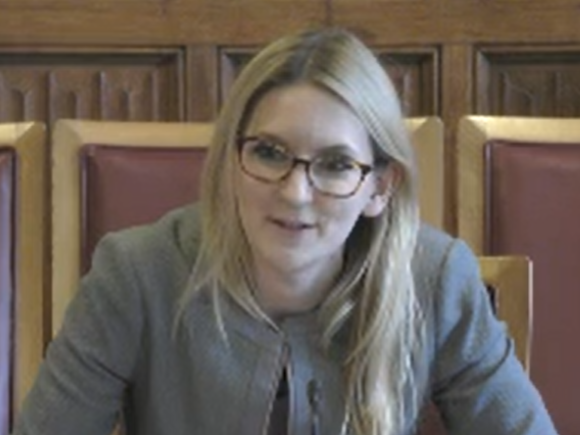
Media minister Julia Lopez has said the Government must try to steer clear of “unintended consequences” of its planned intervention forcing platforms to pay news publishers for their content.
Lopez, first appointed in the role in September last year, said the “worst of what could happen” would be platforms removing news from their feeds altogether as Facebook did in Australia in February 2021 in response to the country’s planned News Media Bargaining Code.
After an eight-day blackout Facebook returned following discussions with legislators and the code was implemented in March of that year. It is believed that, as a result, Google and Facebook (now known as Meta) have agreed to pay news companies more than AU$200m a year in licensing payments, covering more than 20% of publishers’ editorial costs.
Google had made a similar threat to remove news from its search pages in Australia, while it previously shut down Google News in Spain for almost eight years in response to a copyright law that would have allowed publishers to charge it to use their hyperlinks and headlines.
Speaking at a hearing of the Digital, Culture, Media and Sport Committee’s inquiry into the sustainability of local journalism on Tuesday, Lopez said the Government is keen to avoid this type of reaction in the UK when it develops its Digital Markets Unit.
Asked by committee chair Julian Knight whether legislation that is too “onerous” could see platforms downgrade local journalism, Lopez said: “I think you’re right to highlight that as a challenge and it’s something that we as a government have to be very mindful of.
“We don’t want unintended consequences of an intervention. I think we’d have to certainly see how it developed and see whether there were consequences from any kind of bargain that was struck between providers of content and platforms insofar as the DMU made an intervention.
“I mean, obviously, we’d have to watch that very, very carefully, because we would not want to see a situation where the content was driven off a platform altogether. I mean, that would obviously be the worst of what could happen.”
The Queen’s Speech in May contained the long-awaited, wide-reaching Digital Markets, Competition and Consumer Bill, which Lopez said was the “most valued, I think, by journalistic businesses at the moment” among upcoming legislation.
It could ultimately give power to the Digital Markets Unit, a division of the Competition and Markets Authority (CMA) which is currently working in shadow form, to require Google and Meta to pay for news by way of stopping them from abusing dominant market power.
Lopez said this will be how the UK tries to “deal with the imbalance in bargaining power between social media platforms and those who provide and create content”. However there is still no timetable as to when the legislation will begin its journey through Parliament.
Lopez said she had met Rod Sims, the former chair of the Australian Competition and Consumer Commission (ACCC) who helped design the country’s bargaining code, and heard from him how the “mere threat of designation was enough, certainly in the case of Google, to bring them to the negotiating table”.
“The negotiations that subsequently went on between the publishers and the platforms were confidential, but he advised us that they had reached a very beneficial settlement to publishers that had actually allowed a lot of local publications to flourish as well,” she said.
“Local publications, I understand, had gone into a collective bargaining arrangement, and it was very much helping their grassroots journalism in some of the smaller Australian towns.”
The CMA would be “open” to allowing a similar collective bargaining model for small local publishers in the UK, Lopez added.
“We understand that there is this concern about this mismatch in power, and I think that’s precisely what the CMA approach is designed to address, it’s looking at the issues of competition and when they see a clear power imbalance to intervene to address that power imbalance, so I don’t see that it would disadvantage smaller publications in that sense,” she said.
Both Facebook and Google provide support for news publishers in the UK through various schemes, such as the Facebook-funded community news reporters and the Google News Initiative.
“These aren’t insignificant moves but I don’t think they address the fundamental problem, which is that there is a completely unbalanced power situation between the platforms and the content providers,” Lopez said.
“They are effectively getting a very low cost meal out of high-quality journalism, and I think that is a problem that the Government should be concerned about.”
She also responded to the argument that news is a small part of the platforms’ models, something Facebook has repeatedly pointed out in recent months as it revealed plans to drop the Instant Articles format and end payments to US publishers for its News tab.
Lopez said “it would be naive of us to deny that there is a question about what consumers want and what they consume most on platforms” but that high-quality journalism “creates a sense of trust… and does drive a certain level of traffic” so platforms should not “diminish the value of having that content”.
“I think it is valued by their customer base, but I mean, equally, I don’t think you can entirely dismiss the idea that that is not always the thing that’s driving the most clicks. I’m sure that cat memes probably get more clicks than you know, a piece about a very complicated financial instrument but that’s not to say that that has no value in regards to the latter.”
Picture: UK Parliament
Email pged@pressgazette.co.uk to point out mistakes, provide story tips or send in a letter for publication on our "Letters Page" blog
